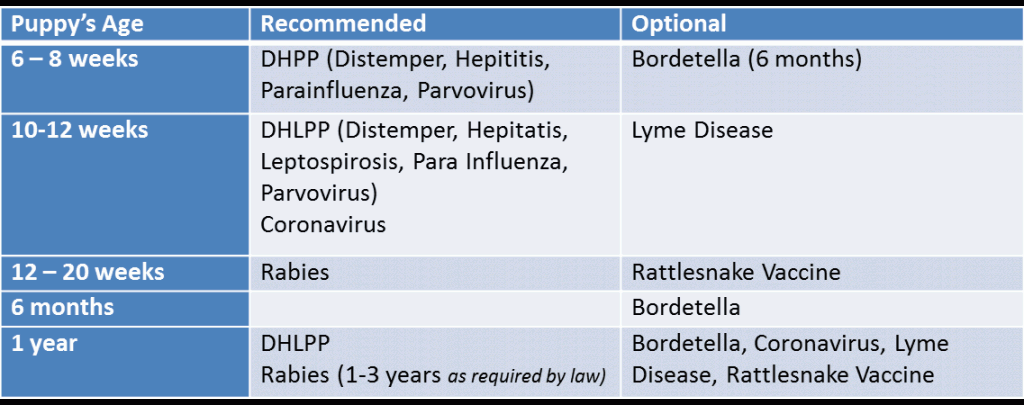Dog Vaccinations - What you need to know
There are so many benefits to owning a dog. They provide you companionship, make you smile, get you moving and outside. In return, it is your job to make sure that your dog is fed and provide him a safe environment. The definition of a safe environment means providing them physical shelter from the elements and ensuring they are contained appropriately to keep them safe from other animals, people, cars, etc. It also means keeping them safe from parasitic and viral infections. The most important way to keep your dog healthy, besides feeding them a good quality food and giving them good shelter, is to ensure that your dog is vaccinated on a regular basis. Since dogs can have many of the same ailments as people, providing both preventative and required medical attention can be expensive. And in these economic times, that can be more than a family can handle these days.
Recommended Timing of Vaccinations:
Check out Paws N Play Vaccination Requirements that are needed before you register for any class
Note: Vaccinating adults dogs is a highly controversial topic these days due to the thought that dogs are being over vaccinated. It is optional to do a titer test, which checks the dog’s immunity levels and can determine exactly which vaccinations are needed except for the Rabies vaccine. The titer test can be just as expensive, estimates approx. $100 just for the test, you would still need to vaccinate your dog with the vaccines that the titer test results show that he requires.
Low Cost Vaccinations:
Vaccinations is definitely highly recommended and the law in the case of Rabies, to maintain your dog’s health. But it can get very costly, especially for owners of multiple dogs. Two pet store chains, Petco and Pet Supply Plus, partner with veterinary services to offer routine low cost vaccination clinics at their stores.
Petco has partnered with Luv My Pet who goes periodically to their stores to provide low cost vaccinations to both dogs and cats. Luv My Pet actually provides vaccinations in 20 states in the US. They generally start scheduling Michigan clinics in early spring. And they are the only one of the 2 that offer the rattlesnake vaccine. Check out their website for location schedule and prices http://www.luvmypet.com/
Pet Supply Plus has partnered with Value Pet Care and offer low cost vaccinations at their stores year around. Their participating store locations and schedules are located at: http://www.petsuppliesplus.com/stores/events/states/michigan.html
Petco has a partner as well called Vetco. Their participating store locations and schedules are located at: https://www.vetcoclinics.com/
There are also several services offered periodically by your county, the Michigan Humane Society, and various rescue organizations that offer FREE vaccinations for dogs who’s owners are unemployed or meet certain income levels. You can search on the internet for these or craiglist where they are commonly published.
Canine Diseases and Symptoms
Provided below is detailed information on the diseases that you need to vaccinate your dog against. Many of these diseases were common and fatal as recently as the 1960s and 1970s. Since then, great strides have been made to ensure the survival of your dog and protect them from these diseases as well as protecting yourself and your family from these diseases as some of them can cross species and infect you as well.
Canine Distemper
A highly contagious viral disease that affects a dog’s respiratory, gastrointestinal and nervous systems. There is no cure for distemper, and once contracted is generally fatal especially for puppies and non-immunized elderly dogs. It can be spread through the air or by contact with an infected animal such as other dogs, raccoons, skunks, foxes, or infected urine/feces. Symptoms include fever (temperature over 103) coughing, sneezing, nose and eye discharge, loss of appetite, vomiting, diarrhea and seizures.
Annual vaccination is required.
Canine Hepatitis
Puppy diagnosed with Hepatitis - Note classic blue tinged eye
This is a highly infectious viral disease, also know as adenovirus, is spread by contact with infected animals, their feces, urine or saliva. Puppies are most susceptible, but dogs of any age can be infected. It affects the liver, kidneys and cells lining the blood vessels. Symptoms initially include fever, cough, and sore throat. But as the infection spreads to the liver, kidneys and the eyes, dogs may exhibit a bluish tint to its corneas or the eyes may look cloudy, nosebleeds, bleeding gums and other bleeding issues. Dogs may also vomit, have diarrhea, loss of appetite, and seizures.
There is no medication specifically for treating infectious canine hepatitis. Treatments include antibiotics, intravenous fluids and blood transfusions. Dogs who recover remain contagious for up to 9 months spreading the virus via their urine. It is important to segregate recovering dogs from other susceptible dogs and animals ensure dog bowls, cages, and potty areas are not shared and constantly cleaned.
Cycle of Leptospirosis Infection
Leptospirosis
An extremely contagious bacterial disease that spreads through contact with nasal secretions, urine or saliva of infected animals or through contaminated water or soil. The bacteria can live weeks to months depending on climate conditions. Once infected, there is an incubation period of 5-14 days. Early signs are not apparent, so infection can go undetected. Leptospirosis primarily damages the kidneys and liver. Symptoms include abdominal pain, diarrhea, fever, vomiting, loss of appetite, severe weakness, stiffness, severe muscle pain and renal changes. Note that early signs of the disease may not be readily apparent. If detected in time, dog can be treated with antibiotics. Recovered animals can continue spreading the disease, which can also affect humans.
Parvovirus
This viral infection is a common, deadly viral infection and usually strikes puppies. It is spread by contact with and infected dog’s blood, feces or vomit. Parvo can be carried on the dog’s hair, feet, as well as on contaminated crates, shoes, and other objects. When the dog licks his feet or other contaminated objects, he contracts the disease. It has an incubation period of 4-5 days, then the puppy will exhibit symptoms that include severe diarrhea, fever, vomiting, loss of appetite and dehydration.
Infected puppies and any puppies that came in contact with infected puppies require immediate veterinary care. All possible contaminated surfaces, bowls, crates, blankets, etc must be disinfected immediately.
Parainfluenza
A highly infectious virus, often confused with kennel cough, but if it goes untreated, can actually cause kennel cough. It spreads quickly among dogs kept in close quarters via nasal secretions. Symptoms include a dry, hacking cough, loss of appetite, depression and runny nose and eyes. Alone, this virus is not fatal, but if the infection persists over a long period of time, it can intensify other infections or diseases such as kennel cough or pneumonia.
Rabies
Dog diagnosed with Rabies
This is an infection of the central nervous system that results in paralysis and death. Rabies is always fatal. It is usually transmitted through the bite of an infected animal. Rabies is a serious public health threat, so it is essential to vaccinate your dog. Most states have laws requiring vaccination.
If dog is infected, he may show extreme behavioral changes such as a normally friendly dog may become irritable, while a normally excitable dog may become more docile. A dog may bit or snap at any form of stimulus, attacking other animals, people, or inanimate objects. As the virus progresses, he will become hypersensitive to light and sound and hide in dark places. Paralysis of the throat and jaw muscles resulting in “foaming at the mouth”. Disorientation, staggering, loss of appetite, and weakness are also symptoms.
Coronavirus
A contagious viral infection of the gastrointestinal tract. Generally the infection is mild except in young puppies or older dogs stressed by multiple infections. Again, this disease is spread through contact with infected blood, feces or vomit. The virus can be shed in stool for many months. Symptoms include vomiting, yellow to orange diarrhea, and dehydration. If contracted, treatment includes maintaining hydration and controlling vomiting and diarrhea.
Optional Vaccines based on Dog’s Lifestyle
Bordetella
This is an airborne bacterial infection causing upper respiratory disease or “kennel cough”. Infected dogs exhibit a severe coughing and gagging symptom. It may be accompanied by sneezing, retching, and nasal discharge. Dogs may catch this when exposed to other dogs in kennels, bark parks, grooming parlors, and any place where multiple dogs congregate. If your dog is going to attend any group training classes, day care, or be kenneled, Bordetella vaccination is a requirement.
Lyme Disease
This is a tick-borne disease that affects both dogs and humans. It is caused by a spirochete (bacteria species) found commonly in deer ticks. The most common symptom is a recurrent lameness due to inflammation of the joints, but there may also be a lack of appetite and depression. More serious complications include damage to kidneys, heart, or nervous system. Sometimes, the symptoms are misdiagnosed as arthritis, but can be isolated via several blood tests. This vaccination is optional, but if your dog will be in an environment where deer ticks are prevalent, it is recommended to give to your dog.
Rattlesnake Vaccine
If you live in Michigan or the north east and central states, you may think that your dog will not need this vaccination. However, think again! The Eastern Mississauga Rattlesnake is native to Michigan and Ontario. August 2011, a dog was bitten in a Lake Orion park. Although this is not a common occurrence by any means, if you and your dog are outside and in wooded areas frequently, you are at higher risk of encountering a Mississauga Rattlesnake. Also if you travel to hike/hunt in areas where rattlesnakes are more common, then you should consider this vaccination. The vaccination delay the effects and reduce the severity of the rattlesnake bites and help dogs survive and recover more quickly with less pain and swelling. If your dog is bitten by a rattlesnake it is recommended that you get immediate veterinary emergency treatment. However, there are many stories of vaccinated dogs who were bitten by a rattlesnake, who did not get immediate veterinary treatment because they were too far out in back country and still survived.





